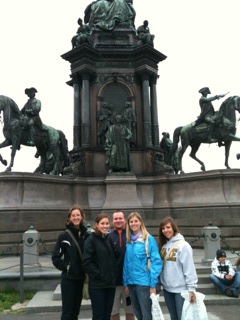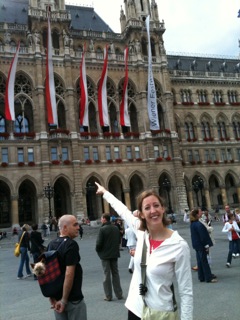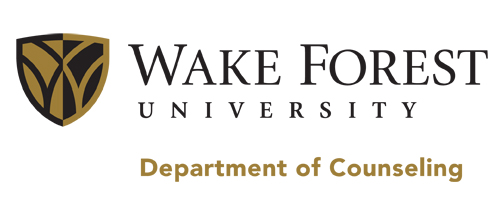The Vienna Theorists 2010
Department of Counseling
Reflections from Vienna, Summer 2010
By Heidi Robinson
“Certainly, travel is more than the seeing of sights; it is a change that goes on, deep and permanent in the ideas of living.” Miriam Beard, author.

Summer school in Austria provided a multiplicity of opportunities to learn and grow personally and professionally. Travelling to Vienna, learning with both peers and professionals and while experiencing the culture of Austria, the courses offered unanticipated insights with respect to the practice of counseling and into human experience. Travel to and experiences in Vienna were a fresh chance to reflect on essential truths: be kind to the stranger among you; be a respectful guest; and, learn in every situation. The travel experience was also a chance to acquire new lessons: each culture has unique talents that can be used for good or evil purposes; personal freedoms do not necessarily render more satisfaction with life; and, culture affects communication styles, but does not mute communication needs. These nuggets of wisdom contributed to both personal and professional growth, were invaluable elements in my journal and my experience.
As one of Europe’s grand cities, opera, architecture, history and art abound and are easily assessed. It does not take one long to ascertain that the United States is a country in its youth compared the rich history of its neighbors on other continents. Castles dot the Danube valley and palaces are numerous even within the city limits of Vienna.

Of course, as counselors-in-training, Vienna offers unique historical gems. It is curious that this culture, and more specifically this city, gifted the world with four dominant theorists in counseling and mental health. It could be that the intellectual resources of Vienna begat more intellectually curious citizens; or, that once Freud broke the seal on the discourse of mental health, the city became a Mecca for those who would pursue or study in the field. Regardless, Vienna fosters a commitment to mental health and has unique opportunities to observe a variety of practices and practitioners who come to the field from varied backgrounds.
Presentations on the theorists are powerful and informative, seemingly providing additional meaning against the backdrop of the very city in which these theorists practiced. Each of the four, Adler, Freud, Frankl and Moreno, took tremendous risks to put forth their theories and thus felt compelled to defend, define and support their work apart from other viewpoints. Being a visitor to the culture provides unique insight into the body of work each theorist.
Mauthausen and Melk: a study in contrasts
Because the horror of concentration camps looms so large in my mind…I somehow envisioned the camp as a larger place. What a lesson that horrendous crimes do not require congruent settings. Mauthausen was neither as large as the evil committed there, nor was the setting as bleak or dark as the ideas that conceived the camps. With the muted grays and blacks, concrete and stark lighting, the museum and theatre interiors actually captured the spirit of the camp and its mission. In fact, it was hard to stand in the center of Mauthausen’s actual buildings and gaze out at green hills, blue skies and summer fields. What a contrast in the creation around the camp and the hell contrived inside. What a powerful testament to the need for counselors to stand as advocates for people who have been forced to remain silent.
Journeying on, we entered Melk Abbey, the contrast to Mauthausen’s despair, where men and women maintained a refuge for teaching, educating and outreach despite the pressures of political change and upheaval; a place created to offer a link to power that exceeds human comprehension.
“Travel is fatal to prejudice, bigotry, and narrow-mindedness.” – Mark Twain
“The world is a book and those who do not travel read only one page.” – St. Augustin
Why should counselors-in-training travel? Both Twain and St. Augustine address the reason: counselors work with people, all people, and honor them in all their varieties and differences. If a counselor in training has never been forced to experience the world outside of their own culture, they may be trapped to view lives through their own cultural lens. The trip to Vienna advances and underscores many of the lessons undertaken in the first year of counselor training: seeing the advantages of people in every situation; respecting the variety of human experience; and, maintaining an awareness of the forces that shape and impact people’s lives and well-being.
Vienna offered students exposure to another view of health-care, counseling and mental health, language barriers, and cultural norms. Students also experienced learning about theory in the ‘greenhouse’ of the theories themselves. Learning can be richer for a change of venue, particularly one that provides lessons with a fresh focus.
Faculty leader: Nathaniel Ivers
Students:
Tasha Adams
Lydia Bennett
Leah Creel
Mark Eades
Miriam Filvarof
Rachel Fishman
David Ford
William Henderson
Clare Johnson
Sara McGarvey
Bethany Montplaisir
Tameka Oliphant
Heidi Robinson
Timothy Silva
Stephanie Tigue

